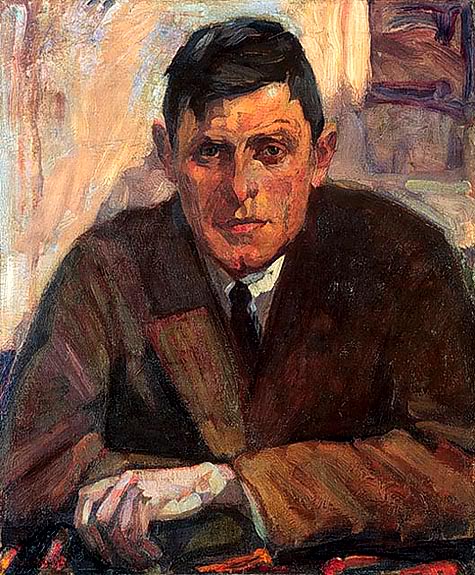Barker Fairley by Frederick Varley, 1920
Further to Michael’s post on Peter Watts’s conviction for obstructing a border guard.
The more things change, the more they stay the same. Exhibit A is Frye’s editorial, which appeared in the Canadian Forum 29, no. 346 (November 1949): 169–70.
Nothing to Fear But Fear
For some months now the American immigration authorities have been busily defending our otherwise undefended border. A number of labour leaders, students, and unfrocked Communists have been held up, turned back, or refused visas, and on a principle of chance well known to duck hunters, they have even managed to bag a few authentic members of the Labor Progressive Party. The recent refusal of visas to Professor Shortliffe of Queen’s and Professor Barker Fairley of Toronto, amounting in at least the latter case to permanent exclusion, has brought the matter more into the open. As practically every Canadian has friends or relatives in the States, Canadian protest has been somewhat muffled. When made, it has usually been carefully qualified by two points: first, that it is intelligible that the U.S.A. should want to exclude people with a vocation for overthrowing its government by force; and second, that as a sovereign nation it has a perfect right to exclude whom it likes.
Well, so it has, but its officials need not be so contemptuous of the national sovereignty of Canada, which, even if smaller, is quite as highly civilized, and quite as interested in democracy. It is an insult to Canada to have American authorities in charge of Canadian immigration who do not know the elementary facts of Canadian political life, and who cannot distinguish a Communist from a social democrat. Earlier in the summer a prominent CCF leader had some difficulty in getting a visa because he had been called a Communist in a Trestrail pamphlet. But no American official should be handling Canadian immigration at all unless he knows all about the trustworthiness of Trestrail pamphlets. A similar political astigmatism must have blurred the official view of Professor Shortliffe, who, though he has associated himself with the CCF, was otherwise merely a professor of French trying to proceed to an appointment in French at Washington University.
Professor Fairley wanted a visa to fulfil an invitation to lecture on Goethe at Bryn Mawr. For any normally competent official, the only question of importance would be: is there anything in this man’s record to indicate that he is going to do anything more subversive than lecture on Goethe? And the answer to that question was obviously no. Professor Fairley is a world famous Goethe scholar, and has never made a political speech in his life. But the officials, in a frenzy of misapplied subtlety, looked up all the occasions on which he had lent his name to the support of a Soviet friendship organization, and gravely decided that he was not sufficiently at war with Russia to be admitted even for a month. After all, had not Mrs. Fairley been sent home from the Peace Conference some months before? True, that action was as high handed and foolish as the exclusion of her husband. But perhaps the authorities reasoned that if they made two foolish decisions over the same family, they would save their faces by their consistency.
It is the element of panic in these decisions that is disconcerting. The immigration service is really a part of the police force, and there is no surer index of the official attitude to democracy than the behaviour of the police. In a totalitarian state it is obviously necessary to keep the police as stupid and brutal as possible. In democracies a reactionary government, if secure and at peace, generally prefers to have its police slightly confused. It likes to feel that if it says to a policeman, “Go out and get some Reds,” he will soon return dragging after him an assortment of labour leaders, clergymen, social workers, liberal intellectuals, the executive of the Housewives Protective Association, and a Jewish tailor named Marks. This level of police activity is well represented in the recent case of a Toronto student arriving from Europe, who, though only passing through to Canada, was detained at Ellis Island for questioning about an alleged “inflammatory speech” made on shipboard. She had made no such speech, and was eventually released with apologies. The news report added that there were seven secret agents on board her ship, and this idiotic bungle was apparently the only result of their combined efforts.
But in an atmosphere of real fear and real suspicion the police must become both more efficient and more tolerant if they are to be of any use in defending democracy. Otherwise, they will be not only unjust to individuals, but dangerous to their own community. The caprice of immigration officials is only a small part of the widespread dither engendered by the loyalty purges and all the other processes of trial by slander and prosecution by hearsay. Insecurity, distrust, and a feeling that an emergency situation demands arbitrary measures are, as everyone must know who has not completely lost his head, the elements that make a dictatorship strong and a democracy weak. The worst enemy of the American people could wish for nothing better than this kind of hysteria.
In so energetic a country as America a lot of steam bubbles off the surface, and those who do not look below the surface get some very curious notions about the American character. Those who know Americans well—and Canadians do know them well—know them to be a people of great courage and high morale, with a deep love of freedom, a solid sense of humour, and inexhaustible reserves of generosity and hospitality. These qualities are, at the moment, not being adequately represented by the quaking sentries on the world’s least dangerous frontier.

